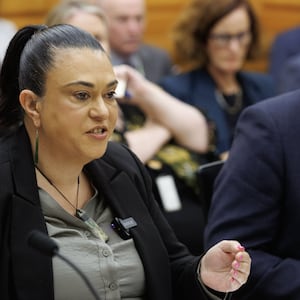Politics
Government Releases Final Evaluation of Bootcamp Pilot Program

The Government’s final evaluation of a controversial bootcamp pilot program has revealed a complex landscape of outcomes regarding its effectiveness in reducing re-offending among young offenders. The report, produced by the evaluation consultancy TIRIA, indicates that out of the nine participants in the program, six reoffended within two months after their release from a Youth Justice Residence.
Despite this concerning statistic, the report highlights a notable reduction in both the seriousness and frequency of offending among participants compared to a control group of youths who were under similar supervision orders but did not partake in the military-style academy. The evaluation states, “Stakeholders were realistic that achieving reductions in the seriousness and frequency of offending would be a success with the background and profile of the MSA [military style academy] rangatahi.”
Children’s Minister Karen Chhour expressed optimism about the findings, asserting that the 12-month program should be considered a success, notwithstanding the level of reoffending. Chhour stated that the program’s aim was not solely to eliminate re-offending but to achieve measurable improvements in behavior among young offenders, which the report suggests it has done.
Mixed Outcomes Highlighted in the Evaluation
The report sheds light on the challenges inherent in addressing youth crime, particularly among those with established criminal backgrounds. While the reoffending rates are troubling, the decrease in the severity and frequency of offenses suggests that the bootcamp may have had a positive impact on some participants.
The pilot aimed to provide structured support and discipline through military-style training, intending to redirect the lives of young offenders. Critics of the program have raised concerns about the efficacy of military-style interventions in rehabilitation, pointing to the high reoffending rates as a significant drawback.
The evaluation also considered feedback from various stakeholders involved in the program, emphasizing the importance of realistic expectations when implementing such initiatives. The mixed results underscore the complexity of youth rehabilitation and the need for comprehensive strategies that address underlying issues contributing to criminal behavior.
Looking Ahead: Implications for Future Programs
As the Government reviews the findings, the future of similar initiatives remains uncertain. The evaluation’s insights will likely inform subsequent policies and programs aimed at reducing youth crime.
Chhour has indicated that the lessons learned from the pilot will be invaluable for shaping future approaches to youth rehabilitation. The report’s findings could pave the way for more tailored interventions that address the specific needs of young offenders, potentially leading to a more effective reduction in re-offending rates.
The mixed results of the bootcamp pilot serve as a reminder of the complexities involved in reforming youth justice systems. As policymakers consider the next steps, the focus will likely remain on balancing the need for accountability with the imperative of rehabilitation.
-

 Sports2 months ago
Sports2 months agoNetball New Zealand Stands Down Dame Noeline Taurua for Series
-

 Entertainment2 months ago
Entertainment2 months agoTributes Pour In for Lachlan Rofe, Reality Star, Dead at 47
-

 Entertainment4 weeks ago
Entertainment4 weeks agoNew ‘Maverick’ Chaser Joins Beat the Chasers Season Finale
-

 Sports5 days ago
Sports5 days agoEli Katoa Rushed to Hospital After Sideline Incident During Match
-

 Sports2 months ago
Sports2 months agoSilver Ferns Legend Laura Langman Criticizes Team’s Attitude
-

 Politics1 month ago
Politics1 month agoNetball NZ Calls for Respect Amid Dame Taurua’s Standoff
-

 Entertainment2 months ago
Entertainment2 months agoKhloe Kardashian Embraces Innovative Stem Cell Therapy in Mexico
-

 World3 months ago
World3 months agoPolice Arrest Multiple Individuals During Funeral for Zain Taikato-Fox
-

 Sports3 months ago
Sports3 months agoGaël Monfils Set to Defend ASB Classic Title in January 2026
-

 Sports2 days ago
Sports2 days agoJamie Melham Triumphs Over Husband Ben in Melbourne Cup Victory
-

 Entertainment1 month ago
Entertainment1 month agoTyson Fury’s Daughter Venezuela Gets Engaged at Birthday Bash
-

 Sports1 month ago
Sports1 month agoHeather McMahan Steps Down as Ryder Cup Host After Controversy





















